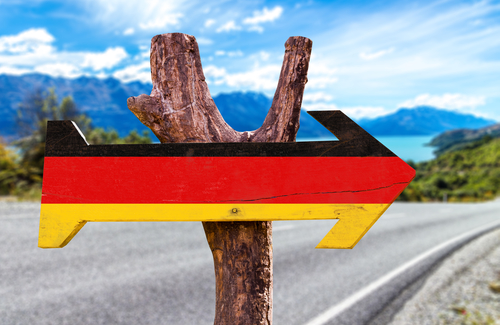During your first month in Germany, you may feel as though you’re caught in a series of confusing red tape mazes. In Germany’s specific brand of bureaucratic orienteering, sequential order is everything. This article is a step by step guide, helping you to navigate this potentially tricky time.Be warned many of these steps are lengthy and involve some waiting; you’ll have to be patient! The German attitude to bureaucracy is certainly not one of ‘winging it’. Instead, you will need to plan and prepare for your first month in the country meticulously.
You’ll need to complete these first three steps before you arrive in Germany.
Decide on a visa
Before you begin packing your bags, decide what visa you’ll be applying for.
If you’re coming to Germany primarily to work, there are a few different visas choose from. These include a blue card visa (which requires you to have a contact with a German company before applying), a job seeker visa (which gives you six months to find a German job), or a self-employed/freelance visa. Under this last option, you can also apply for an artist visa, which will allow you to work. However, you must be able to convince the foreigners office that you and your art are a valuable asset to Germany. Find out more about the different types of work permits available in Germany here.
If you want to study in Germany or learn German, you can apply for a student or language-course visa. You can also get a ‘study preparation’ visa, which allows you to test the waters and prepare your German before diving headlong in.
Another possible option is a working holiday visa. While these are easy to apply for, applicants must be between 18 and 30 and come from either Australia, Canada, New Zealand, Japan, Hong Kong, South Korea or Taiwan, so they won’t be suitable for everyone.
The website Germany Visa gives an overview of the types of visa on offer and more details about the eligibility requirements for each. Additionally, you can also call the German Embassy in your home country and ask them for visa advice.
Get insured
Without fail, health insurance is always the first document German bureaucrats ask for. Even before you apply for your visa, you will need to take out health insurance. Depending on the visa you want to apply for, this step can either be entirely painless or a test of endurance!

While it is only a temporary solution, it is nonetheless possible to take out provisional health insurance with an international company while you are in the process of applying for jobs and first moving to Germany. However, further down the line, you’ll need to prove that you’ve progressed to either a German or a Germany-sanctioned health insurance plan. Find out more about how to obtain health insurance in Germany here.
Apply for your visa
If you come from the US, Canada, Australia, New Zealand, Israel, Japan, or South Korea then you can technically take all these steps with your feet on German soil. That is, you can enter and remain in Germany for 90 days without a visa. However, this route is not recommended.
Applying for a visa can be a lengthy process, and very few bureaucrats in Germany’s foreign offices speak English. Therefore, if you do want to apply for your visa within Germany, bring a German speaker with you. Furthermore, in many German cities even just getting a visa application appointment can take months, let alone actually getting the visa approved. If there’s no pressing reason to go to Germany before you have your visa, then don’t. Not only is it risky, but living without both an income and official documents is best avoided.
Instead, visit the German embassy in your home country. This means you can be assured that your communications will be in your local language, and that you can continue to earn money before an expensive intercontinental move. Generally, your embassy will issue you a visa that needs to be given final authorization in Germany. However, this simply involves going into the foreigners’ office, presenting the paperwork you will already have, and getting another stamp of approval. Normally, if your visa has been issued abroad, there’s no reason to think your status would change once in Germany.
Once your visa has been approved and you’re insured, you can start your new life Germany.
Find a new home
Not only does getting a home mean you’ll have a roof over your head, but without an address, you won’t be able to complete any of the next steps. Finding an apartment in Germany can take time, something that many expats anxious to start a new life don’t have. One of the ways new-comers get around this challenge is to take a short-term apartment when they first arrive.

In Germany, it is common for people to rent out their furnished apartments for any period between two weeks to six months while they go on an extended holiday or temporarily relocate. Because these properties are subleases, applying for them is a quick process and the paperwork involved is minimal. Normally, you will simply have to sign an agreement with the main leaser or Hauptmieter and you’re good to go.
A sublease is not only much more affordable than staying in a hotel, but you can also use this address to get started on your subsequent tasks. For instance, you can use your sublease agreement to get your Anmeldebestätigung, an indispensable document you’ll need often.
Browse subleases on Tempoflat and WG Gesucht under the search term 'befristet'. Finding a place that’s available for at least one or two months will give you enough time to find something permanent. You can find more information on apartment hunting in Germany here.
Get your Anmeldebestätigung
This document can feel confusing if you’re not used to a fair amount of creating, stamping, and filing paperwork. However, obtaining this document should be second on your to-do list in Germany. You’ll need it to open a bank account, set up internet, and sign up for a phone plan.
You get an Anmeldebestätigung from a registry office, known as a Bürgeramt or Einwohnermeldeamt. Depending where you live, obtaining this document can take five minutes or a full day. Find your nearest Bürgeramt and figure out what days it’s open for people without an appointment; this is advisable for anyone in a major city, as getting an appointment can take weeks. Gather your rental contract (a short-term sublease contract is fine) and your passport, and head over there.
A piece of advice if you live in a big, busy city: get there early, preferably at least half an hour before opening time. If you live in a smaller city, there’s a good chance you can just stop by and go straight in. Once you have your Anmeldebestätigung, you will automatically be sent an Identifikationsnummer (identification number) in the mail. Hold onto this, as it will be useful when you need to start thinking about tax.
You will legally need an Anmeldebestätigung within the first two weeks of moving to Germany or changing your address. This means you’ll have to visit the Bürgeramt each time you move within the country. For some people, this is a good motivation to find the right flat and stay there!
Get a bank account
Once you have your Anmeldebestätigung, head to your preferred bank with this document and your passport to open an account. Having a German bank account will be essential for renting a permanent apartment, organizing phone and internet plans, and paying bills.

It is also important to note that compared with other countries in the Anglosphere, Germany is intensely cash oriented. Make sure you always have cash handy, as there are many restaurants, cafes and pharmacies that don’t take credit or debit card payments, especially from international banks.
Organize your post
Even if you’re only staying in a sub-lease apartment for one month, make sure your surname is on the postbox, or your mail won’t be delivered. This could mean missing some important documents including your bank card or identification number.
If for any reason you can’t put your name on the postbox, make sure you have told all the appropriate bodies to include a C/O section in your address with the name that is on the postbox.
Organize your in-house necessities
While it is common for landlords to take care of utilities such as water, gas, and electricity, they won’t organize telephone lines or internet connections. In order to set these up, you’ll need to have your address registered as well as a German bank account. These things take a while to install (a few weeks at best) so arrange it early.
Also, your life will be a lot easier if you buy a German SIM card. Do a bit of research though, as the cost of telephone plans can vary radically between providers.
Switch to German health insurance
If your visa was issued in your home country using an international health insurance plan, it’s mandatory that you find an appropriate German plan. There’s more information on German health insurance here.
Enroll in a German course
German is quite a challenging language to learn, meaning that the learning-by-living technique doesn’t always work. Starting classes as soon as you can after arriving is the best way of setting yourself on that track. Knowing at least basic German will improve your life in Germany immeasurably.

Go to the Finanzamt (tax authorities)
If you want to work, then you’ll need a Steuernummer (tax ID number). To obtain this, you may need to bring along the letter containing your Identifikationsnummer, which you should have received in the mail after registering your address. Even for locals, the German tax system can be rather confusing. Most expats hire accountants, seeing them as a necessary investment for navigating Germany’s complex tax system.
Visit the Ausländerbehörde (foreigners’ office)
If your visa was issued in your home country, you will need to make a trip to the foreigners’ office in Germany to get the final tick of bureaucratic approval. You will need to show them your Anmeldebestätigung and your German health insurance. After that, all your paperwork is complete!
Have you lived in Germany? Share your thoughts in the comments below, or answer the questions here to be featured in an interview!

